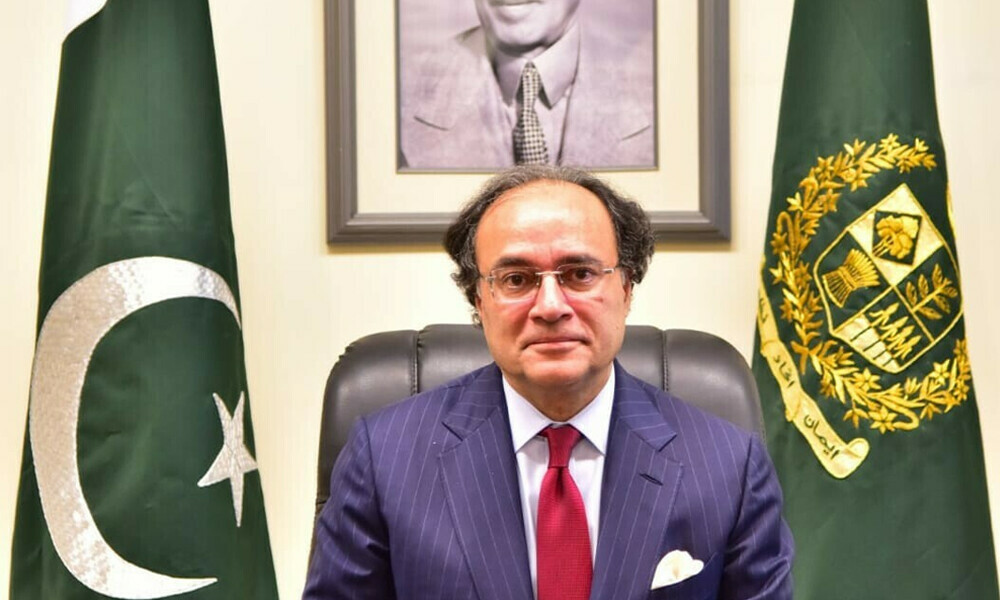In assuming the mantle of Pakistan’s Finance Minister, Muhammad Aurangzeb Khan steps into a role fraught with complexities and challenges. With a distinguished career spanning over three decades in the financial sector, including leadership positions at Habib Bank Limited (HBL) and JP Morgan, Khan brings a wealth of experience and expertise to his new role. However, the economic landscape he inherits is marked by a myriad of issues ranging from inflation and unemployment to significant budget and current account deficits. In this detailed analysis, we delve into the challenges and opportunities that await Khan as he embarks on the task of steering Pakistan’s economy towards stability and growth.
Negotiating with the IMF:

One of Khan’s immediate challenges is negotiating with the International Monetary Fund (IMF) to secure much-needed financial assistance. Pakistan’s economy has been grappling with macroeconomic instability, including a looming current account crisis, making it imperative for Khan to navigate discussions with the IMF effectively. Securing a new deal with the IMF is crucial for stabilising the economy, restoring investor confidence, and laying the groundwork for sustainable growth. Khan’s ability to engage in constructive dialogue with the IMF while advocating for policies that prioritise the welfare of Pakistan’s citizens will be critical in this endeavour.
During his interactions with reporters after being sworn in, Muhammad Aurangzeb Khan emphasised his commitment to implementing much-needed reforms and securing a new deal with the IMF. He underscored the importance of swift action, stating, “No debates, no waste of time — just a steadfast commitment to implementation.” Khan also expressed his intention to negotiate a “longer and larger” economic bailout package with the IMF, signalling his determination to address Pakistan’s economic challenges head-on.
Debt Restructuring:

Addressing Pakistan’s mounting debt is another pressing challenge that Khan must confront. The country’s debt profile is alarming, with total debt and liabilities surpassing Rs77.66 trillion ($271.2 billion). Muhammad Aurangzeb Khan must work on debt restructuring to ensure that Pakistan’s debt remains sustainable and manageable in the long run. This entails negotiating rollovers or lower interest rates on existing loans, particularly focusing on managing the Chinese portion of the debt, which constitutes a significant portion of Pakistan’s external liabilities. Khan’s ability to navigate complex debt restructuring negotiations will be instrumental in safeguarding Pakistan’s financial stability and future prosperity.
During discussions on debt restructuring, Khan emphasised the need for proactive measures to address Pakistan’s debt challenges. He highlighted the importance of restructuring both domestic and external debt, with a special focus on managing the Chinese portion of the debt. Khan underscored the significance of ensuring that Pakistan’s debt remains sustainable and manageable, stating that this would be a top priority for his ministry.
Managing Political Pressures:

In addition to economic challenges, our new finance minister Muhammad Aurangzeb Khan must navigate the political landscape, balancing the demands of the governing party with the imperative for fiscal reforms. Political pressures to shore up funds and mitigate the negative fallout of painful reforms pose a significant hurdle for Khan. Effectively managing these pressures while implementing necessary reforms will require political acumen, strategic decision-making, and a commitment to prioritising the long-term interests of the country over short-term political gains. Khan’s ability to build consensus, forge alliances, and communicate effectively with key stakeholders will be paramount in this regard.
During his tenure as Finance Minister, Khan needs to emphasise the importance of navigating political pressures while staying focused on the broader goal of economic reform. He has reiterated his commitment to implementing structural reforms and fiscal consolidation measures, despite potential resistance from political quarters. Khan has stressed the need for bipartisan cooperation and unity in addressing Pakistan’s economic challenges, highlighting the importance of putting the country’s interests above partisan politics.
Formalising the Informal Sector:

Pakistan’s informal economy presents a significant obstacle to revenue generation and economic growth. Khan must work on formalising the informal sector to increase the tax base, reduce illicit activities, and promote transparency and accountability in economic transactions. This entails digitising the tax system, reducing cash circulation, and expanding the tax net to include segments such as retail, wholesale, trade, and agriculture. Khan’s efforts to formalise the informal sector will not only enhance revenue collection but also foster a more inclusive and resilient economy that benefits all segments of society.
During discussions on formalising the informal sector, Khan emphasised the importance of leveraging technology to enhance transparency and accountability. He highlighted the need for comprehensive digitisation of the tax system, stating that this would play a crucial role in widening the tax base and curbing illicit activities. Khan also underscored the significance of addressing structural issues in the economy to promote formalisation and sustainable growth.
Reforms in the Energy Sector:

The energy sector remains a critical area requiring reform to address circular debt and improve efficiencies. Khan must collaborate with the energy ministry to overhaul the sector, transition from a single-buyer market to a multi-buyer market, and promote renewable energy sources. This includes restructuring transmission and distribution, investing in alternative energy sources such as wind and solar, and addressing debt issues with independent power producers (IPPs) and Chinese stakeholders. Khan’s ability to spearhead comprehensive energy sector reforms will be pivotal in ensuring energy security, reducing dependence on imported fuels, and promoting sustainable development.
During discussions on energy sector reforms, Khan emphasised the need for bold measures to address circular debt and enhance energy efficiency. He highlighted the importance of diversifying Pakistan’s energy mix and promoting renewable energy sources as part of a broader strategy to achieve energy security and sustainability. Khan also stressed the need for collaboration with stakeholders to implement reforms effectively and ensure the long-term viability of the energy sector.
Privatization and Investor Sentiment:

Privatising state-owned enterprises (SOEs) and attracting investment are essential for revitalising the economy and fostering private sector-led growth. Khan must follow through on privatisation initiatives, streamline regulatory processes, and create a conducive business environment to attract domestic and foreign investment. Improving investor confidence through transparent policies, regulatory certainty, and effective governance mechanisms will be crucial in stimulating economic activity, creating jobs, and driving innovation and entrepreneurship. Khan’s commitment to promoting privatisation and attracting investment will be instrumental in unlocking Pakistan’s economic potential and accelerating its transition to a more dynamic and competitive economy.
During discussions on privatisation and investor sentiment, Khan reiterated his government’s commitment to creating a favourable business environment and attracting investment. He emphasised the importance of transparency and accountability in privatisation processes, stating that this would build investor confidence and enhance Pakistan’s attractiveness as an investment destination. Khan also highlighted the need for regulatory reforms to streamline processes and remove barriers to investment, signalling his determination to drive economic growth through private sector participation.
Moving Away from a Consumption-Based Economy:

Shifting away from a consumption-based economy towards export-led growth is imperative for sustainable development and external balance. Khan must focus on enhancing exports, promoting value-added industries, and improving competitiveness in global markets. This entails undervaluing the rupee to boost export competitiveness, providing incentives for export-oriented industries, and investing in infrastructure and technology to enhance productivity and efficiency. Khan’s efforts to diversify the economy, promote exports, and attract foreign investment will be critical in reducing reliance on imports, narrowing the trade deficit, and fostering inclusive and sustainable growth.
During discussions on economic diversification and export promotion, Khan emphasised the need for a comprehensive strategy to enhance Pakistan’s competitiveness in global markets. He highlighted the importance of investing in human capital, infrastructure, and innovation to support export-oriented industries and drive economic growth. Khan also stressed the need for targeted interventions to address structural constraints and create an enabling environment for export-led development, signaling his government’s commitment to unlocking Pakistan’s export potential and driving economic transformation.
Muhammad Aurangzeb Khan faces a formidable task as Pakistan’s Finance Minister, with a host of challenges and opportunities awaiting him. With his extensive experience in the financial sector and a track record of leadership, Khan is well-equipped to navigate the complexities of Pakistan’s economy and drive meaningful change. By effectively addressing key challenges such as negotiating with the IMF, managing political pressures, implementing structural reforms, and promoting private sector-led growth, Khan has the opportunity to set Pakistan on a path towards economic stability, prosperity, and inclusive development. As he embarks on this journey, Khan’s vision, leadership, and commitment to reform will be instrumental in shaping Pakistan’s economic future for generations to come.


